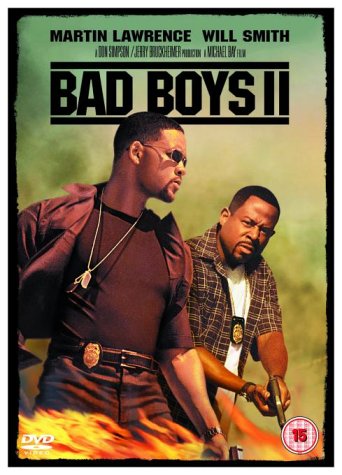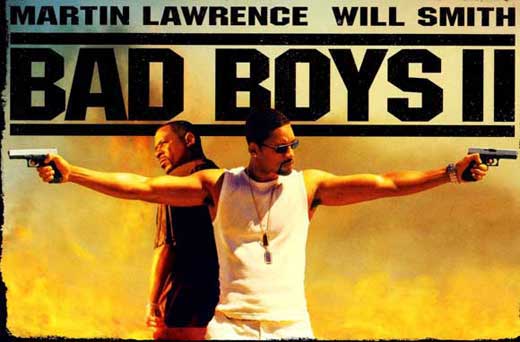***Bad Boys 2***
Bad Boy Records (originally Bad Boy Entertainment) is a record label founded in 1993 by producer/rapper/entrepreneur Sean "Diddy" Combs and Mark Pitts.[1][2] Today it operates as a subsidiary of Warner Music Group, and is distributed by Atlantic Records.History
Beginnings:After his climb from a non-paying internship to becoming an A&R executive at Uptown Records, Sean ("Diddy") Combs was abruptly terminated in 1993 by then CEO John Galante and Andre Harrell—reportedly due to his own difficulty to work with David E. Thigpen/Nassau. Together with school friend Mark Pitts - who had interned with Combs at Uptown - the pair founded Bad Boy Records in 1993. The label’s first release was "Flava In Ya Ear" by Craig Mack, followed quickly by Mack's debut album, Project: Funk Da World in 1994. On the heels of these releases came "Juicy" and Ready To Die, the lead single and debut album from The Notorious B.I.G. (who would also be referred to as "Biggie"), released the same year. While Mack's album went gold, Ready to Die achieved multi-platinum success. Dominating the charts into 1995, B.I.G. became one of the genre’s biggest names of the day and Bad Boy’s premier star. Also in 1995, the label continued its success with platinum releases by Total and Faith Evans. Bad Boy, meanwhile, staffed a bevy of in-house writer/producers, including: Chucky Thompson, Easy Mo Bee, Nashiem Myrick and D Dot—all of whom were instrumental in producing many of Bad Boy’s most noted releases during this time.
Feud with Death Row:
The quick success of The Notorious B.I.G., and Bad Boy as a company, did not sit well with others, most notably the Los Angeles-based Death Row Records. For two years leading up to 1995, Death Row (and the west coast hip hop scene that it led) had largely dominated the commercial rap scene. With Bad Boy, and east Coast Scene of hip hop, now garnering the notoriety that it was, resentment loomed as the attention and acclaim now had to be shared.Suge Knight, CEO of Death Row Records, held Combs responsible for the shooting death of his friend Jake Robles, allegedly at the hands of Combs' bodyguard. Tensions were heightened when west coast rap superstar Tupac Shakur (2Pac) signed with Death Row Records after having recently forged an indignant rivalry with the Notorious B.I.G. as well as other members of Bad Boy. After the June 1996 release of Hit 'Em Up a diss song targeted at B.I.G., tensions reached a boiling point. Tupac was gunned down on a Las Vegas street on September 7 by an unknown gunman after leaving a Mike Tyson-Bruce Seldon boxing match at the MGM Grand. Tupac would later be pronounced dead on September 13, 1996. Though Bad Boy issued a public statement of condolence, Tupac's death left unrest among those on the west coast. On March 9, 1997, as the label readied for the release of Biggie’s double album, Life After Death, he too was shot and killed after leaving a party for his upcoming album, in circumstances similar to Tupac's. The deaths of Biggie and Tupac left many to speculate if the coastal hostility had been responsible for their demise. The depth of the police investigations were criticized by public and judicial sources alike. Both cases remain officially unsolved, however in Biggie's death, police officer David Mack has been indicated by former LAPD officers.
Life after Biggie:
Posthumously, Biggie’s Life After Death reached number one on the Billboard Top 200. Its first two singles, "Hypnotize" and "Mo Money, Mo Problems" also topped the singles charts. The album eventually sold over 10 million copies in the United States alone, and is one of the highest selling rap albums ever in the U.S..In early 1997, Puff Daddy had begun recording his own solo debut album. The first single, "Can't Nobody Hold Me Down," peaked at number one on the rap, R&B, and pop charts that spring. In response to Biggie’s death, the label rush-released a Puff Daddy tribute song, "I'll Be Missing You", which featured Biggie's widow, Faith Evans, and Bad Boy's R&B singing group 112. The single topped the charts for eleven weeks and became the hasty second single from Combs’ album, No Way Out, which was released in the summer and sold seven million copies. Mase, Combs’ newest protégé, in the meantime was immediately thrust into the void that Biggie left. His own debut album, Harlem World, also released the same year, would go 4x platinum. Due to the successive successes of Life After Death, No Way Out and Harlem World, by the end of 1997, Bad Boy as a label and brand name had hit a commercial peak. During this time, the label began to promote its latest signing—the Yonkers-based act, The L.O.X., who had been prominently featured on various Bad Boy releases that year. Though highly anticipated, their 1998 debut album, Money, Power & Respect sold below commercial expectation. Shortly thereafter, the group departed the label and entered into a long standing publishing dispute with Combs that would continue up until 2005.
In the years to follow, Bad Boy saw a commercial decline. In 1999, Mase became religious and abruptly retired from the business, leaving a serious dent in the company, especially since his second album had just been released. Bad Boy found some success with Shyne, a young rapper from Brooklyn, who garnered both praise and criticism for his deep voice and slow flow—which many considered to be too reminiscent to, and perhaps a rip-off of the Notorious B.I.G. Meanwhile, Combs' own follow-up albums failed to generate the same kind of acclaim that his debut had. In an attempt to further market himself, he underwent several name changes; from "Puff Daddy" to "P. Diddy," to now simply "Diddy.
As the 2000s emerged, Bad Boy had noticeably floundered. Many of its more noted acts would eventually vacate the label, while those who remained saw their album sales dwindle as time went on. In spite of continually releasing new material, and various attempts at building artists to the status of Bad Boy’s deceased icon, few proved as successful as the company hoped.
Southern rap duo 8Ball & MJG released an album called Living Legends to some success in 2004, prompting the creation of Bad Boy South—which would eventually house acts such as Boyz N Da Hood and Yung Joc. In 2002, Combs’ participated in MTV's Making The Band 2, which spun off the Bad Boy assembled act, Da Band. In spite of their MTV exposure leading to a gold selling debut album, Combs later disbanded the group. At this time, the label also signed a rapper named Aasim, whose Bad Boy debut (as of 2011) still has not been released.
Resurgence:
Bad Boy saw its fortunes improve in 2005, with the success of releases from new signees: Cassie and Yung Joc (both of whom would score top five singles/debut albums). Also in 2006, Bad Boy hit paydirt with Making The Band 3’s Danity Kane, whose debut album topped the charts at #1 (the labels first chart topping album since the Bad Boys II soundtrack three years prior), and spun off a top five single. Their second album, Welcome to the Dollhouse also debuted at #1, and containted the group's second top ten single "Damaged". Diddy also signed Day26 and Donnie Klang to the label.Recently Combs has dissolved Danity Kane, terminating Aubrey O'Day's, D. Woods', Shannon Bex's and Aundrea Fimbres' contracts. Currently Dawn Richard is working as solo artist and songwriter for Bad Boy. In March 2009, it was reported that Richard and Combs were assembling a new girl group. But later formed a group called Dirty Money with Richard, Combs and a singer-songwriter named Kalenna Harper. In April 2009, Bad Boy signed Red Cafe.








No comments:
Post a Comment